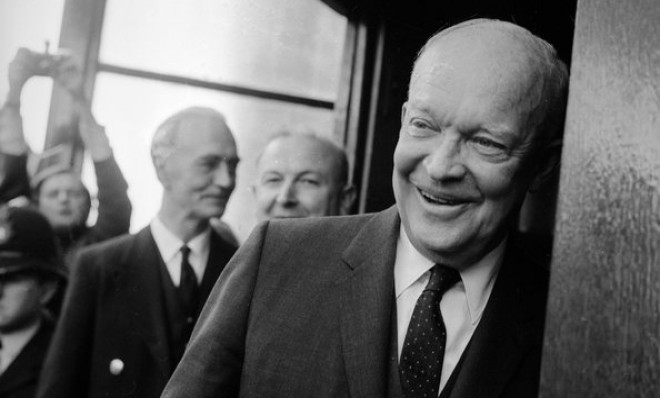Today in history: The death of a president
In 1969, Dwight D. Eisenhower died. He left behind quite a legacy.

A free daily email with the biggest news stories of the day – and the best features from TheWeek.com
You are now subscribed
Your newsletter sign-up was successful

March 28, 1834: The Senate censured President Andrew Jackson over his efforts to defund the Second Bank of the United States. Jackson earlier vetoed a bill that would have re-charted the bank; he thought it was corrupt, benefited mostly rich Americans and was a threat to liberty. Whig lawmakers were angry over Jackson's refusal to hand over documents in the matter; the public opposed the Senate's censure of the president.
March 28, 1969: Dwight D. Eisenhower died. He was the 34th president, serving between 1953 and 1961. Dwight David Eisenhower was really named David Dwight; he reversed his name when he enrolled at West Point. Before entering politics, Eisenhower spent decades in the Army, rising to the rank of five-star general during World War II. The wartime achievement that "Ike," as Eisenhower was known, will always be remembered for, of course, was leading the invasions of North Africa in 1942–43 and France on D-Day — June 6, 1944.
Eisenhower was a center-of-the road Republican. He continued many New Deal programs launched by Franklin Roosevelt and oversaw an expansion of Social Security. He oversaw big government investment in everything from infrastructure (notably the Interstate Highway System) to science and technology (such as the Defense Advanced Research Projects Agency, or DARPA, which eventually led to the internet, among other things). Eisenhower also oversaw the creation of America's space agency, NASA, a response to the Soviet Union's aggressive space program.
The Week
Escape your echo chamber. Get the facts behind the news, plus analysis from multiple perspectives.

Sign up for The Week's Free Newsletters
From our morning news briefing to a weekly Good News Newsletter, get the best of The Week delivered directly to your inbox.
From our morning news briefing to a weekly Good News Newsletter, get the best of The Week delivered directly to your inbox.
On the foreign policy front, Eisenhower kept a campaign pledge and ended the Korean War (an uneasy truce still exists today). He also ordered a CIA coup in Iran, installing the Shah — creating resentment that, in some circles, still exists today. To counter rising Soviet power, he emphasized a rapid buildup of America's nuclear arsenal — though he reduced funding for conventional military forces. A Cold War term — the "domino theory" — came to prominence during the Eisenhower era; he said that if one country fell to communism — say, Vietnam — its neighbors would soon fall as well. In 1956, Eisenhower refused to support three key allies — Israel, Britain, and France — when they invaded Egypt during the Suez Crisis; later that year he also refused to help Hungarian freedom fighters who were resisting the Soviets.
In terms of social policy, Eisenhower thought segregation was a states' rights issue, but after the landmark Brown vs. Board of Education decision ordering school desegregation, he sent federal troops to Little Rock, Ark., to support the enrollment of nine black students ("the Little Rock Nine"). He also signed civil rights legislation in 1957 and 1960 to protect the right to vote. He implemented desegregation of the armed forces in two years and made five appointments to the Supreme Court. He was the first term-limited president in accordance with the 22nd Amendment. In his last speech to the nation as president, in 1961, he warned of a military establishment that was too powerful and threatened America's economic prosperity.
Quote of the day
"A people that values its privileges above its principles soon loses both." — Dwight D. Eisenhower
A free daily email with the biggest news stories of the day – and the best features from TheWeek.com
More from West Wing Reports...
-
 Quentin Deranque: a student’s death energizes the French far right
Quentin Deranque: a student’s death energizes the French far rightIN THE SPOTLIGHT Reactions to the violent killing of an ultra-conservative activist offer a glimpse at the culture wars roiling France ahead of next year’s elections.
-
 Secured vs. unsecured loans: how do they differ and which is better?
Secured vs. unsecured loans: how do they differ and which is better?the explainer They are distinguished by the level of risk and the inclusion of collateral
-
 ‘States that set ambitious climate targets are already feeling the tension’
‘States that set ambitious climate targets are already feeling the tension’Instant Opinion Opinion, comment and editorials of the day